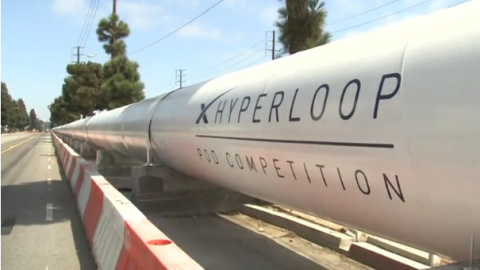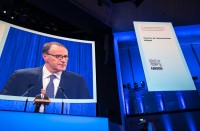
CALIFORNIA, United States (Reuters) — A team from the Technical University of Munich in Germany, known as WARR Hyperloop, won a competition hosted by Elon Musk’s SpaceX on Sunday (August 27) to design the fastest pod for a proposed future transportation system of giant vacuum tubes known as the “Hyperloop.”
The WARR (pronounced: VAR) team’s pod traveled down the mile-long Spacex Hyperloop test track at 324 kilometers per hour (201 miles per hour).
“That was an amazing job,” Spacex founder and CEO Elon Musk told the team.
The Hyperloop transportation system was originally conceived by Musk, who envisioned a high speed underground transport system that would shoot passengers in enclosed capsules through low-pressure steel tubes at up to 800 mph (1,288 kph), cutting the journey time between San Francisco and Los Angeles to under half an hour.
By traveling in vacuum tubes on magnetic cushions, Hyperloop trains would avoid being slowed down by air pressure or the friction of wheels on rails, making them faster and cheaper to operate, supporters say. A number of startups have begun to develop the technology, despite concerns about the cost and practicality.
Sunday’s competition was the second hosted by SpaceX at its track near its Hawthorne, California, headquarters. Three teams advanced to the final stage of the competition and sent their pods down the Hyperloop tunnel.
Paradigm Hyperloop, an international team from Northeastern University in Boston, Massachusetts and Memorial University of Newfoundland and Labrador in Canada used air based levitation for their pod. Team member Ben Lippolis said that was Musk’s original intention when he released his open-source Hyperloop design plans.
“A lot of teams have decided to go with magnetic levitation systems — they’re much more well known and currently used in high speed applications. We decided to pursue an air-based levitation system, primarily because it was the original idea that Elon introduced when he introduced the Hyperloop concept in 2013,” Lippolis said.
The Paradigm pod hit a top speed of 101 kilometers per hour (62 miles per hour).
Swissloop, a team of students from ETH Zurich, built a pod propelled by compressed air.
“We have the cold gas thruster, that’s a little rocket nozzle and a pressure tank with 150 bar and we expel something like nitrogen out of the back and it moves our pod forward,” said the team’s head of engineering Daniel Kaufmann.
Musk announced at the end of the competition that SpaceX would hold a third competition in 2018.







